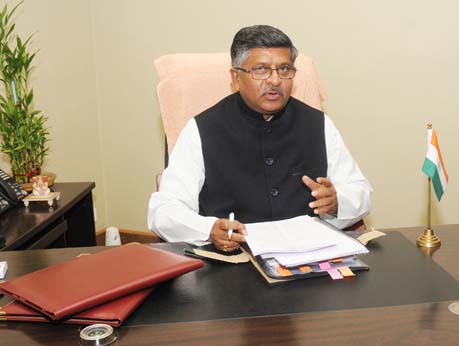
New Delhi, May 28 2014: India's new minister for Information Technology and Telecommunications is Ravishankar Prasad.
A veteran of the last National Demcratic Alliance (NDA) government, 59-year old Prasad, has been a practicing lawyer and holds a masters degree in political science from Patna University and a law degree. He has held positions of minister of state in the ministries of coal and mines, law & justice and information & broadcasting in the NDA government (1998-2004)
"The Telecom Department has been in the news for many of the wrong reasons and one of my first priorities will be to set things right," Prasad was quoted in Economic Times, as saying yesterday. The paper suggested that the minister might announce confidence boosters such as a reduction in telecom taxes & levies down to APAC levels of 5% from 30% in India. He also needs to speed up ambitious, but as yet unrealized national optic fibre network (NOFN) to usher in `broadband for all' as envisaged in National Telecom Policy 2012.
----------------------------------------------------------------------------------------------------------------------------------------------------
"Just like Vajpayee Government was known for building road highways, the Modi Government should be known
for broadband highway" Ravishankar Prasad, Telecom Minister, India
----------------------------------------------------------------------------------------------------------------------------------------------------
Hindu Businessline quotes Prasad this morning: "Manufacturing as a whole needs a big push in India, but manufacturing of electronics sector can be given further boost, which can bring considerable number of employees".
The paper quotes Prasad: "The way things have happened in the past have dented investors’ confidence. We need to restore that,” adding that global investors need a stable taxation regime and retrospective tax should be generally avoided as the country needs foreign investment to boost the economy.
Meanwhile the Manufacturer's Association of Information Technology has shared its wishlist and concerns, with the new government:
- Ecosystem for Manufacturing – With electronic imports standing at $16 billion, government should put enabling policies in place for sprucing up hardware manufacturing to facilitate investments in the country.
- Inverted Duty Structure – Inverted duty structure makes domestically manufactured goods uncompetitive. The new government should look at exemption of Special Additional Duty on all components used by the IT manufacturer.
- Unfriendly Operational policies – Implementation woes in Compulsory Registration order, delays in granting of EPR authorizations by State Pollution Boards, no fixed process for registrations and unclear deadlines badly impact the industry. The IT industry has always been a trendsetter in terms of quality and safety. Government should jointly work with the industry on self-regulation.
- Exchange Rate Variations – The IT Hardware industry finds it difficult to compete with exchange rate variations. The Government should look at amending the adoption of Exchange Rate Variation clause for all IT hardware product purchase contracts, regardless of delivery period under the General Finance Rules (GFR), 2005
- Subsidies for PC Penetration – The government should look at increasing PC penetration in Indian households by enabling infrastructure, providing low-cost loans and discount vouchers for purchasing PCs.
While India has experienced significant growth in PC sales in the past few years, it still has IT penetration below 10%, MAIT points out. Says MAIT President Amar Babu: “India is a difficult place to start any business, especially when it comes to enforcing contracts and obtaining building permits. India should restore confidence by addressing these issues and checking India’s miserable rank of 134 in World Bank’s ‘ease of doing business. The Government should consider lowering interest rates on corporate borrowing and a steady transformation of India’s complex tax structure”.
Business Software Alliance
BSA, The Software Alliance today welcomed the formation of the newly elected Government of India and looked forward to working with ministries of jurisdiction to accelerate the country’s digital economy and create a conducive environment for software innovation. “With its large, highly skilled workforce and robust investment in research and development, India is well positioned to be a global leader in technology innovation,” said BSA President and CEO Victoria Espinel. “We congratulate Prime Minister Modi on the new government’s forward-looking agenda for economic growth.”